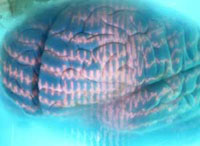 |
|||||||||
|
Education Feature Stories: Other News: |
|
Response to Training Demands of Neuroscience Field
Understanding the genetic predisposition to schizophrenia or identifying which neurotransmitters are implicated in Parkinson’s disease are major scientific challenges calling upon the expertise of more than one discipline. In response to the demands of modern neuroscience, five years ago the two interdisciplinary graduate programs of neurobiology and behavioral neuroscience merged to form the interdisciplinary Graduate Program in Neurobiology and Behavior. Forty predoctoral students and more than 85 faculty members from the UW School of Medicine, the School of Public Health and Community Medicine, and the College of Arts and Sciences participate in the collaborative program.
“This is an area of research that cries out for and is best utilized by a multidisciplinary approach,” said Dr. Neil Nathanson, professor of pharmacology and former co-director of the graduate program. Dr. Albert Fuchs, a pioneer in interdisciplinary behavioral neuroscience research, was co-director with Nathanson. In August 2001, Dr. Tom Reh, professor of biological structure and Dr. Michael Shadlen, associate professor of physiology and biophysics, became the program’s new co-directors.
 |
Histological slices of brain tissue are one of the physiological aspects of neuroscience that are studied in the UW's interdisciplinary Graduate Program in Neurobiology and Behavior. |
“The first five years of the program, led by Drs. Nathanson and Fuchs, brought together the wide-ranging research efforts in the neurosciences on the UW campus and recruited an outstanding group of bright, energetic, and highly motivated students,” said Reh. “In our next five years, Dr. Shadlen and I would like to maintain this high standard of excellence and bring this program to national preeminence. With all the outstanding neuroscientists at this university, there is no reason why we cannot have the best neuroscience graduate program in the country.”
The Graduate Program in Neurobiology and Behavior offers training in molecular, developmental, cellular, systems, and behavioral neuroscience. First-year students participate in a year-long neuroscience core class, three quarter-long lab rotations, a weekly journal club and biweekly seminars presented by faculty members or invited scholars, and a program-wide retreat combined with a campus-wide poster session. Students are exposed to the broad field of neuroscience and then encouraged to concentrate on a specific area of interest. Student research encompasses a wide range of topics from the biophysics of ion channels to primate behavior.
All neurobiology and behavior graduate students must also serve as teaching assistants for at least two quarters. Many students choose to teach laboratory classes in the UW’s new neurobiology undergraduate program. The graduate students help develop the undergraduate labs and protocols.
The undergraduate neurobiology program will graduate its third class in 2002. The two-year undergraduate program is also an innovative collaboration between the College of Arts and Sciences and the School of Medicine. The program consists of coursework in various aspects of neurobiology taught by faculty in the departments of zoology, psychology, physiology, pharmacology, and biological structure.
Each year approximately 100 students apply to the undergraduate neurobiology program and 40 to 50 are admitted. Last year two neurobiology undergraduates shared the Franco Prize, an undergraduate prize for excellence in biology research. Another neurobiology student won the UW President’s Medal, an award recognizing the student with the most distinguished academic record of all graduating seniors. Many of the neurobiology undergraduates go on to medical school or Ph.D. programs.
The undergraduates take a combination of courses that build on knowledge gleaned from preceding coursework. The medical school provides the space and state-of-the-art physiology equipment for laboratory work in the Health Sciences Center. Experiments scheduled over a series of weeks give students the opportunity to master experimental techniques and try different approaches. More than half of the undergraduates complete individual laboratory projects. Undergraduates are encouraged to work side-by-side with graduate students in labs supervised by faculty sponsors.
“We’ve created a kind of microuniversity,” said Dr. William Moody, professor of zoology and chair of the neurobiology undergraduate program. “We want students to have intense, rigorous coursework, but also to be able to experience the excitement of neuroscience research in individual laboratories as well.”
Coordinator of the graduate program Shadlen agreed: “This is an exciting moment for neuroscience at the UW. In addition to the breadth and enthusiasm for the science, there is a spirit of appreciation for work across disciplines that makes for an unusually rich environment.”
|
| UW AMC Medical Center | UW School of Medicine | Harborview | UW MC | Search UW AMC | UW Home | Contact Us | ©2001-2002, University of Washington Academic Medical Center. All rights reserved. Please honor our copyrights. |
|